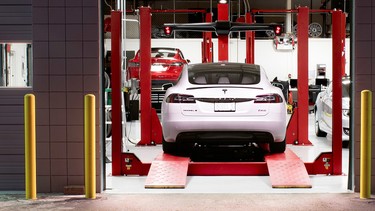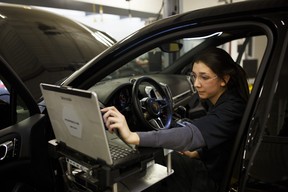[ad_1]
EVs are almost twice as likely to have serious problems as gas-powered cars, according to a survey by U.K. website ‘Which?’

Article content
One of the benefits of switching to electric propulsion, say the experts, is that their fewer rotating mechanical bits result in fewer breakdowns. That’s the theory, at least.
Advertisement 2
Article content
In reality, a recent study in the United Kingdom by consumer website Which? says that electric vehicles are actually less reliable than their petrol-powered (that’s “gasoline” in British) competitors. In fact, according to the respondents, EVs are almost twice as likely to develop a serious fault — 31 per cent for electrics, versus just 19 per cent for petrol power — as conventional cars.
Not only that, the typical repair takes longer for cars powered by batteries — five days versus three — than for those swinging pistons. Worse yet, the other supposed superiority of EVs — that they can be more easily and quickly repaired with over-the-air updates — seems to take a hit in the survey of 48,034 car owners (2,184 of which owned pure electrics).
Advertisement 3
Article content
According to the survey, the number one glitch needing attention in EVs was software-related. Married with the fact that, as I said, EVs were also off the road for a survey-topping average of 5.1 days every year, it’d seem there’s little evidence yet of a tangible benefit to OTA updates and repairs.
-

Motor Mouth: How many EV charging stations will we really need?
-

Motor Mouth: Why are Europeans buying more EVs than North Americans?
Indeed, that apparent anomaly seems to be perplexing some experts, James Gibson, the head of technical information for England’s Royal Automobile Club, telling thismoney.co.uk that “There is no question there are fewer moving parts with electric cars, which makes them more reliable than a petrol,” but noting “the software running them is more complex, which has the potential to cause some issues.”
Advertisement 4
Article content
Perhaps more surprising is that Tesla, the face of EVs and the manufacturer with the most experience building electrics, is the least reliable of the lot. According to the Which? survey, a whopping 39 per cent of Teslas up to four years old had at least one fault, and one in 20 had had a serious no-start situation or a breakdown serious enough that it had to be taken off the road.
On the other hand, owners of Kia’s e-Niro reported their cars to be the most reliable of electrics, with just six per cent of owners reporting a fault of any kind; and just one in a hundred saying their vehicle failed to start or broke down. That said, e-Niro owners who did report a serious breakdown had to wait an average of eight-and-a-half days for a repair, almost three times as long as the three-and-a-half days required to get a Tesla back on the road. Nonetheless, it’s worth noting that while the Kia was the most reliable compact SUV in the segment — triumphing over its gas, diesel, and hybrid competitors — Teslas were the least reliable of all electrics.
Advertisement 5
Article content

Making matters worse is that, as in so many other jurisdictions, Tesla is the dominant player in England’s EV segment, the Model Y and 3 accounting for almost 25 per cent of the 10,417 BEVs sold in February 2022. Extrapolate the numbers through the entire study and Tesla’s fallibility may well be a large part of the reason that the Which? study found that EVs are the least reliable cars on British roads.
Conventional gasoline-powered cars, however, are not the most reliable vehicles on the road. That honour would seem to be held by conventional — not plug-in — hybrids. According to the survey, just 17.3 per cent of hybrids had even a single fault, and their 3.9 days off the road and 5.6-per-cent breakdown rate was superior to EVs as well. At least part of that advantage is explained by the fact that Toyota, the automaker with the most enviable reliability record in the entire industry, enjoys, according to Electrek, a healthy 22 per cent of British hybrid sales. Marrying all the survey’s data with market share numbers seems to imply it matters less what you drive than who makes it.
Advertisement 6
Article content
Indeed, according to Which? cars editor Adrian Porter, “Year on year, Tesla comes up as one the most fault-prone, unreliable car manufacturers thanks to feedback from current owners,” adding that it seems almost “counterintuitive” that electric cars, with so few moving parts, are the most fault-prone in the survey, while full hybrids, “which have two systems of propulsion, are the most dependable.”
Marrying all the survey’s data with market share numbers implies it matters less what you drive than who makes it
This seeming fallibility, however, doesn’t seem to dampen Tesla fans’ ardour, however. Consumer Reports, for instance, notes that the Tesla Model S and X — along with Porsche’s Taycan and the Jaguar I-Pace — scored second-last on its five-point reliability scale, while the magazine considers the Chevrolet Bolt one of the most reliable vehicles on the road regardless of powertrain. (One guess as to which car garners all the headlines and sales.) Other surveys reinforce this seeming dichotomy, a J.D. Power report noting that “while Tesla is seen to have poor quality, Tesla owners are more highly satisfied overall, indicating their willingness to overlook quality problems.”
Advertisement 7
Article content
In other words, the badge displayed on the trunk is more important than the quality of what’s under its hood.

[Author’s note: The anomaly of Tesla having the worst reliability records while maintaining the highest reputation ratings is not hardly unique to the U.K. and the U.S. A recent study by Protégez-Vous (Quebec’s equivalent to Consumer Reports), says the Model 3 is the least reliable of the plug-ins it surveyed — from Toyota, Tesla, Chevrolet, Hyundai, and Nissan.
And, as the U.K. data indicates, while the propulsion systems — essentially the electric motors and batteries — are admirably bullet-proof, other aspects of basic construction such as suspension and steering (2018 to 2021 Model 3s seem particularly susceptible to upper A-arm breakdown) still seem to trouble the Silicon Valley upstart.
“The Tesla Model 3 has a reputation for prestige, but the quality of finish… is unworthy of a car selling for $60,000 or more,” concluded Protégez-Vous. That established automakers have a major advantage in this regard also emulates the British data, the most reliable plug-in in Protégez-Vous’ study being — drum roll, please — Toyota’s Prius Prime. And mirroring virtually every study of inter-brand reliability, Protégez-Vous concludes that “Tesla disappoints, Toyota holds up.”]
[ad_2]
Source link






More Stories
How to Fix an Inflatable Water Slide: The Four Most Common Problems
The Importance of Replacing Outboard Powerhead Gaskets
Do You Need a Part for Your Harley Davidson Motorcycle?